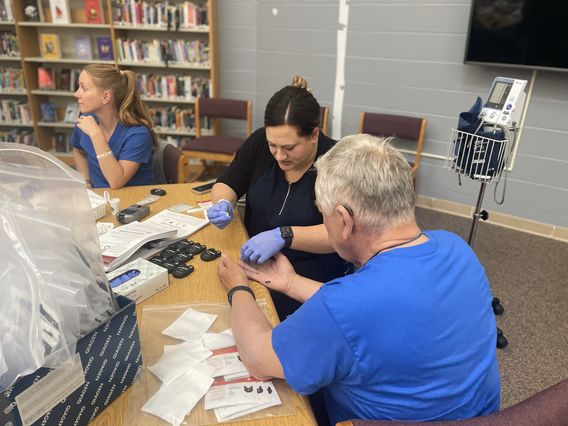
The Hormel Institute has partnered with Mower County Public Health to create Wellness on Wheels. Thanks to grants from the Austin Area Foundation and the Mower Freeborn Cooperative, Wellness on Wheels is a service that offers free preventative health screenings to rural Mower County communities on a monthly rotating basis.
Upcoming Wellness on Wheels events can be found on our Community Events page.
Let's talk more about why preventative health screenings are so important—and how they can have a big impact on your health.
Why preventative health care matters
Preventative health care is a proactive approach to addressing health concerns before they become a problem. The goal is to increase the likelihood that people will stay healthy and well for as long as possible.
A simplified comparison is that preventative health care is like getting your car’s oil changed.
Most people know that if you do this, your car will last longer and you will be more likely to find problems with your car before you are stranded on the side of the road. Likewise, doing simple preventative screenings for your health can help your doctor find problems sooner and make you more likely to get treatment for any health conditions early, when it is most effective.
If you could greatly decrease your chances of having a heart attack or stroke with a simple blood pressure screening, most people would say that's a no-brainer. So why, then, do so many American adults skip these important screenings?
Health screening barriers
The National Institutes of Health estimates that only 8% of adults in the United States undergo routine preventative screenings.
Healthy People 2030, a U.S. Department of Health and Human Services (HHS) initiative to identify public health priorities, found that people described barriers to getting preventative screenings such as cost, not having a primary care provider, living too far away from health care providers, and not being aware of what preventative services they should be getting.
The recent pandemic also dramatically decreased the number of people who got routine screenings. A study by the Centers for Disease Control and Prevention (CDC) stated that underutilization of preventive services is often an implementation gap. In other words, providers are not prioritizing preventive care services, because with our current health care reimbursement model, hospitals and physicians are paid to treat disease rather than prevent it.
Prevention is a key protection against cancer
As you can see, there are many barriers to preventive health, but here are just a few of the reasons you should make it a priority:
- It would save money: It is estimated that 27% of all health care spending in the United States is spent on preventable illnesses. That equates to around $730 billion.
- It would save lives: According to the National Commission on Prevention Priorities, over 100,000 deaths could be prevented each year if we could improve the delivery of just 5 preventive services.
- It would benefit the economy: The Milken Institute estimates that chronic illnesses cost the economy $4 in lost productivity for every $1 spent on health care.
- It would reduce cancer risks: Depending on the type of cancer, routine screenings can reduce mortality rates between 20 and 90%.
- It would reduce risk of heart attack and stroke: High cholesterol and high blood pressure are often called “silent killers” because they often show no symptoms but put you at higher risk for stroke, heart attack, and heart disease.
At The Hormel Institute, we not only want to inspire discoveries that improve and extend human life, we also want to reduce barriers and provide opportunities for our community to help extend their own lives. The Wellness on Wheels program is just beginning, but we hope that it will continue to grow and offer more preventive services to benefit our community for years to come.
